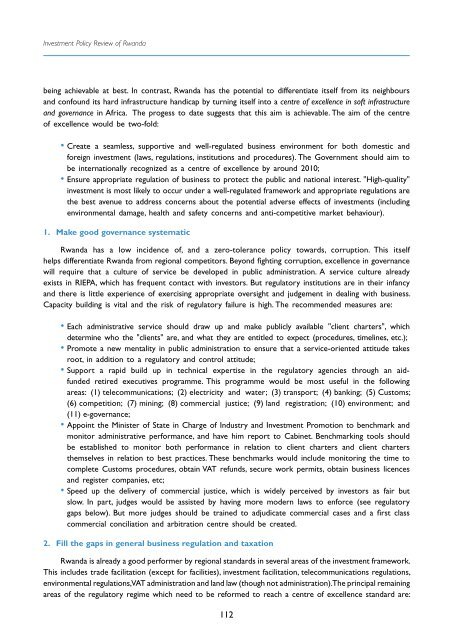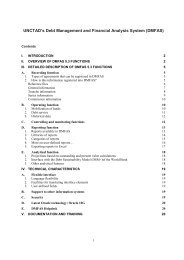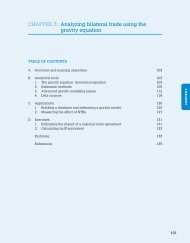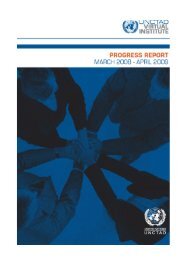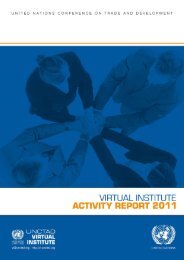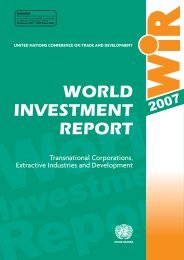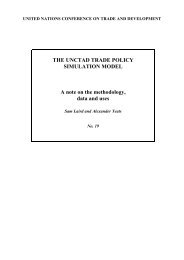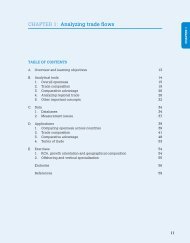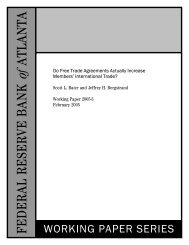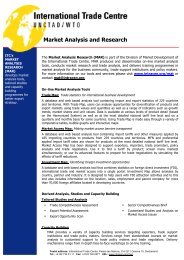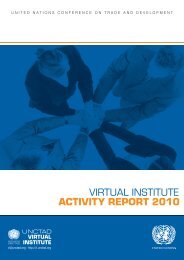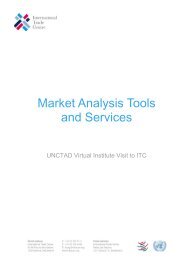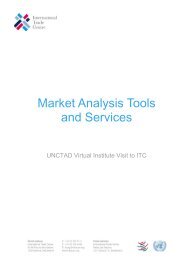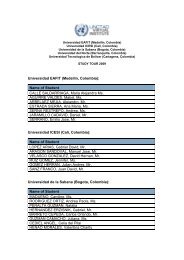Investment Policy Review - Rwanda - UNCTAD Virtual Institute
Investment Policy Review - Rwanda - UNCTAD Virtual Institute
Investment Policy Review - Rwanda - UNCTAD Virtual Institute
Create successful ePaper yourself
Turn your PDF publications into a flip-book with our unique Google optimized e-Paper software.
<strong>Investment</strong> <strong>Policy</strong> <strong>Review</strong> of <strong>Rwanda</strong><br />
being achievable at best. In contrast, <strong>Rwanda</strong> has the potential to differentiate itself from its neighbours<br />
and confound its hard infrastructure handicap by turning itself into a centre of excellence in soft infrastructure<br />
and governance in Africa. The progess to date suggests that this aim is achievable. The aim of the centre<br />
of excellence would be two-fold:<br />
• Create a seamless, supportive and well-regulated business environment for both domestic and<br />
foreign investment (laws, regulations, institutions and procedures). The Government should aim to<br />
be internationally recognized as a centre of excellence by around 2010;<br />
• Ensure appropriate regulation of business to protect the public and national interest. "High-quality"<br />
investment is most likely to occur under a well-regulated framework and appropriate regulations are<br />
the best avenue to address concerns about the potential adverse effects of investments (including<br />
environmental damage, health and safety concerns and anti-competitive market behaviour).<br />
1. Make good governance systematic<br />
<strong>Rwanda</strong> has a low incidence of, and a zero-tolerance policy towards, corruption. This itself<br />
helps differentiate <strong>Rwanda</strong> from regional competitors. Beyond fighting corruption, excellence in governance<br />
will require that a culture of service be developed in public administration. A service culture already<br />
exists in RIEPA, which has frequent contact with investors. But regulatory institutions are in their infancy<br />
and there is little experience of exercising appropriate oversight and judgement in dealing with business.<br />
Capacity building is vital and the risk of regulatory failure is high. The recommended measures are:<br />
• Each administrative service should draw up and make publicly available "client charters", which<br />
determine who the "clients" are, and what they are entitled to expect (procedures, timelines, etc.);<br />
• Promote a new mentality in public administration to ensure that a service-oriented attitude takes<br />
root, in addition to a regulatory and control attitude;<br />
• Support a rapid build up in technical expertise in the regulatory agencies through an aidfunded<br />
retired executives programme. This programme would be most useful in the following<br />
areas: (1) telecommunications; (2) electricity and water; (3) transport; (4) banking; (5) Customs;<br />
(6) competition; (7) mining; (8) commercial justice; (9) land registration; (10) environment; and<br />
(11) e-governance;<br />
• Appoint the Minister of State in Charge of Industry and <strong>Investment</strong> Promotion to benchmark and<br />
monitor administrative performance, and have him report to Cabinet. Benchmarking tools should<br />
be established to monitor both performance in relation to client charters and client charters<br />
themselves in relation to best practices. These benchmarks would include monitoring the time to<br />
complete Customs procedures, obtain VAT refunds, secure work permits, obtain business licences<br />
and register companies, etc;<br />
• Speed up the delivery of commercial justice, which is widely perceived by investors as fair but<br />
slow. In part, judges would be assisted by having more modern laws to enforce (see regulatory<br />
gaps below). But more judges should be trained to adjudicate commercial cases and a first class<br />
commercial conciliation and arbitration centre should be created.<br />
2. Fill the gaps in general business regulation and taxation<br />
<strong>Rwanda</strong> is already a good performer by regional standards in several areas of the investment framework.<br />
This includes trade facilitation (except for facilities), investment facilitation, telecommunications regulations,<br />
environmental regulations, VAT administration and land law (though not administration). The principal remaining<br />
areas of the regulatory regime which need to be reformed to reach a centre of excellence standard are:<br />
112


